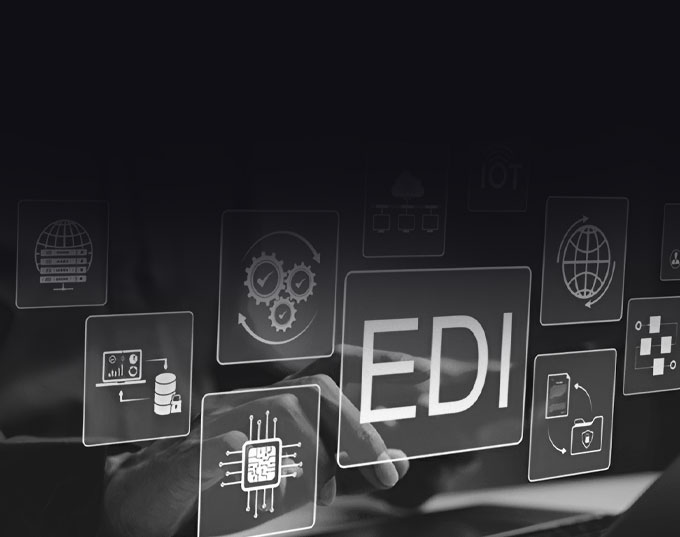Streamline Your Data Exchange & Unlock Efficiency With Our Expert EDI Services
EDI (Electronic Data Interchange) is a game changer in automating data transfers securely. Tap into the potential of faster, error-free processing.
As a leading EDI services provider, A3Logics delivers custom EDI solutions that streamline business transactions, ensure seamless data exchange, and automate workflows. From mapping specific changes, new trading partner onboarding, and B2B EDI integration to implementing a new EDI architecture.





















From cloud-based tools to EDI managed services A3Logics provides a variety of custom EDI solutions. To maximize results, we can also assist you in determining which of these options is best for you and work to integrate them with your internal and external systems. Choose A3Logics as your EDI service provider company to accelerate your process, reduce costs and securely connect business partners, customers and ecosystems.
EDI (Electronic Data Interchange) is a game changer in automating data transfers securely. Tap into the potential of faster, error-free processing.
 Managed EDI
Managed EDI EDI Support
EDI Support Open Enrollment
Open Enrollment EDI Integration & Mapping Services
EDI Integration & Mapping Services EDI Consulting Services
EDI Consulting Services Custom EDI Solution Development
Custom EDI Solution Development EDI Migration Services
EDI Migration Services Staffing and Training
Staffing and TrainingA3Logics is a leading provider of comprehensive EDI services, offering top-notch managed EDI services to businesses of all sizes. We take care of the entire EDI process, right from implementation and integration to ongoing management and support.
As a trusted EDI service provider, our team assists organizations in streamlining their B2B communication and supply chain processes through robust EDI services. Our team of experts specializes in managing all aspects of EDI, ensuring smooth data exchange and efficient collaboration with partners and suppliers.
Our benefits enrollment services enable you to streamline your enrollment operations, reduce errors, and enhance overall data accuracy, improving customer satisfaction and operational efficiency. Trust A3Logics to handle your “Open Enrollment” needs with the utmost professionalism and precision.
Our B2B EDI integration services enable seamless transaction flow, eliminating manual errors. Our experts ensure precise EDI mapping and translation (EDIFACT, ANSI X12), optimizing efficiency by integrating data with your ERP and backend systems.
Sail through EDI implementation and continuous management effortlessly with our comprehensive solutions tailored for all sizes of businesses. Our EDI services empower you with real-time insights into your supply chain, facilitating superior inventory management & enable proactive decisions.
We offer Custom EDI development services that can help businesses exchange data with their supply chain partners in a seamless way. Get tailored electronic data interchange and services that are created specifically for your business needs.
Our EDI migration services ensure a smooth transition from legacy systems or outdated platforms to advanced, scalable EDI services. We handle end-to-end migration, including data transfer, process reconfiguration, and validation, while maintaining minimal downtime.
Our EDI staffing and training services provide skilled professionals and tailored training sessions. Whether you need on-demand EDI specialists or comprehensive, hands-on training, we support your team with the knowledge and resources to manage EDI efficiently.
Eliminate manual errors, speed up orders, and optimize inventory with seamless EDI integration.
We offer comprehensive EDI Services that reduce operational costs and ensure seamless business-to-business communication.

Connect with partners instantly, exchange data effortlessly, and drive business growth with EDI.
We offer comprehensive EDI consultancy for a range of industries, including.

Our EDI services streamline supply chain and logistics processes by enhancing data flow, order tracking, fleet management, transportation and inventory management. We help businesses achieve real-time insights and seamless communication, for better collaboration, minimizes errors, and ensures a responsive supply chain.
Discover More
We help health insurance providers with electronic data interchange services for efficient data processing, policy management, and claims handling. Our EDI services ensure secure, compliant data exchanges between insurers and healthcare providers, improving claims accuracy, reducing processing time, and enhancing customer satisfaction.
Discover More
In retail, we facilitate seamless EDI transactions for inventory management, order processing, and supplier communication. Our EDI services enhance supply chain visibility, enabling retailers to optimize stock levels, improve order accuracy, and deliver a smooth shopping experience from supplier to customer.

In healthcare procurement, we ensure secure and efficient EDI transactions for medical supply ordering, tracking, and compliance. Our custom built solutions provide real-time insights and data accuracy, helping healthcare providers source critical supplies promptly and maintain quality care standards.
Discover MoreTransforming Claims with Intelligence: ClaimPro Corp’s Journey to Data-Driven Success
Discover More
The Roadblock: Rising Costs and Delayed Settlements in Auto Insurance
Discover More
Driving Digital Transformation: Carlyle Insurer’s Modernized Approach to Claims Management
Discover More
Redefining Benefits Administration: BenifiQ’s Journey to Automation and Precision
Discover More
Empowering Employee Choices: BenifiQ’s Journey with AI-Driven Decision Support Systems
Discover More
Transforming our Client’s EDI Operations into a Powerhouse of Precision
Discover More
EDI Excellence: Transforming Benefits Administration with Professional Services
Discover More

EDI (Electronic Data Interchange) is a game changer in automating data transfers securely. Tap into the potential of faster, error-free processing.
At A3Logics, we handle a wide range of EDI documents across Healthcare, Health Insurance, Supply Chain & Logistics, and Retail, ensuring seamless data exchange and compliance.
Eliminate manual errors, speed up orders, and optimize inventory with seamless EDI integration.
Implementing EDI or Electronic Data Interchange services offers numerous benefits for any business, including

Get rid of bottlenecks, reduce errors, and speed up transactions with automated EDI workflows.
At A3logics, we follow a structured process for EDI solutions to ensure consistency, offer streamlined solutions, and deliver the best possible solution.

A3Logics supports multiple EDI standards, making it easy for businesses to communicate with diverse trading partners seamlessly. Our flexible approach ensures smooth data exchange across industries, promoting compatibility and compliance with all necessary EDI protocols.
We cater to various in-house formats, simplifying data integration with your existing systems. Our team adapts to unique data structures, enabling effortless internal data flow and reducing the need for time-consuming adjustments, so your business operates without interruption.
A3Logics provides real-time data visibility, empowering businesses to monitor and manage EDI transactions efficiently. With immediate insights into each process stage, decision-makers can respond proactively to issues, ensuring a streamlined workflow.
A3Logics offers smooth trading partner onboarding, easing the process of connecting with new partners. Our structured approach reduces setup time, simplifies compliance, and enables rapid integration, helping you expand partnerships effortlessly and meet market demands faster.
We excel in the integration and deployment of EDI maps, transforming raw data into compatible formats for your systems and partners. Our meticulous EDI mapping process facilitates accurate data exchange, reducing errors and enhancing the speed and accuracy.
Our proactive support team monitors EDI processes 24/7. We detect and resolve issues before they affect operations. This ensures business continuity, enhances system performance. Allowing your team to focus on core functions with confidence in uninterrupted EDI services.
A3logics redesigned the logistics software of a mobile app solutions company’s end customer. The project included creating a comprehensive solution with reporting features, order tracking, and system updating.

“Their distinct flexibility and their strong communication were the project’s main assets.”


A construction technology company hired A3logics for custom software development. They created a construction digital platform that allows users to see project areas, distribute resources, and share data.
“Their software has proven essential in the construction sector.”

A3logics created and implemented a custom logistics software solution for a wealth management platform. This included developing features and integrating real-time tracking and data analytics functionalities.

“They ensured our collaboration went well by providing timely items and responding quickly to our requests.”


A3logics created and executed a personalized Generative AI system that featured chatbots for customer service, prediction algorithms, and AI-powered data analysis tools.

“Their technical expertise and reactivity were excellent.”


A3logics has developed an administrative management system for a health testing company. The product is designed to handle operations such as consultant matching, time reporting, and compensation management.

“The collaborative team we’ve worked with has shown great flexibility and excellent project integration.”


A transportation company hired A3logics to create a custom software program for freight activity tracking. The team also created invoicing tools and a driver-tracking system connected to a dispatch system.

“Their thorough inquiry and engagement with our team reflect their commitment to understanding our requirements.”


Businesses can gain a lot from EDI, such as enhanced accuracy in data sharing, cost savings, and better efficiency. Better customer service and stronger business relationships result from its ability to expedite communication, decrease manual data input errors, cut transaction processing times, and improve supply chain collaboration.


Marketing Head & Engagement Manager